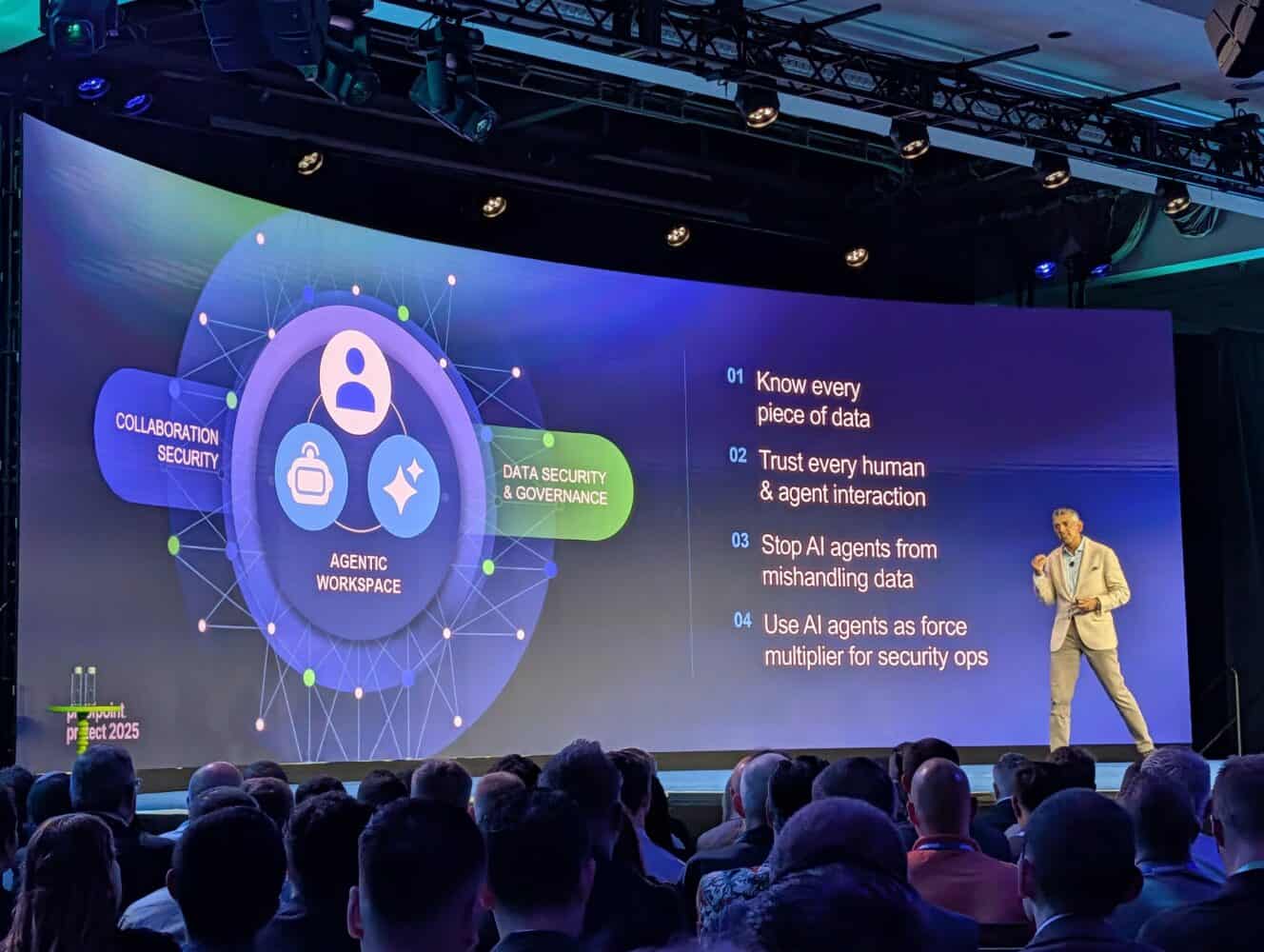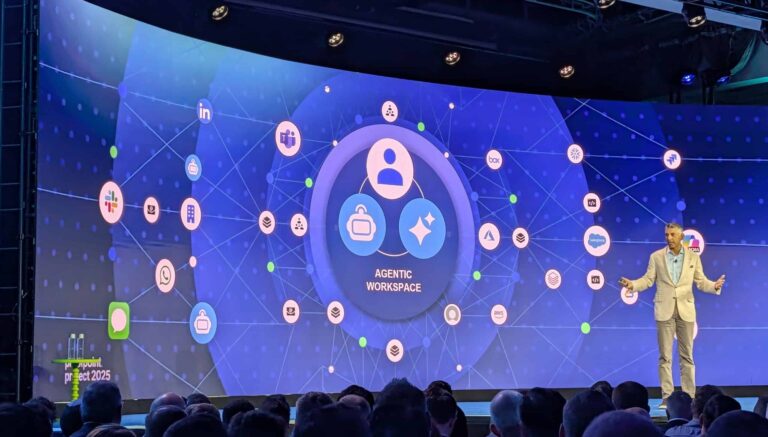AI agents are radically changing the digital workplace. Whereas employees used to work mainly with each other, we are now seeing the emergence of the so-called agentic workspace, in which people and AI agents collaborate on tasks. This shift presents new opportunities, but also introduces additional risks to data protection and cybersecurity. Proofpoint wants to play a role in this new reality.
Proofpoint is demonstrating this during its Protect 2025 conference in Nashville, which Techzine is attending. In the agentic workspace, both humans and AI agents face similar risks. Social engineering attacks, which traditionally targeted human users, are now also being applied to AI systems via prompt engineering. Additionally, both employees and agents can unintentionally or intentionally share sensitive information.
The difference lies in the scale and speed at which AI operates. According to Proofpoint, artificial intelligence consumes, generates, and processes data at a level that was previously unimaginable. This increases the risk of sensitive information being exposed on a large scale. Security tools and strategies used in the digital workplace, such as collaboration protection and data security, remain indispensable, but must now apply to AI agents as well as human users.
From digital to agentic workspace
The current digital workplace is built on email, SaaS applications, cloud infrastructure, and collaboration platforms. This environment offered speed, flexibility, and scalability, but also introduced new vulnerabilities. In recent years, Proofpoint has therefore focused firmly on human-centric security, in which people are seen as the most critical line of defense.
However, the agentic workspace goes further. In addition to supporting tasks, AI agents also perform independent assignments. They even manage entire processes. Employees no longer perform all actions themselves, but direct agents that work on their behalf. This fundamentally changes the threat landscape and requires a new generation of security solutions, emphasizes Proofpoint CEO Sumit Dhawan.
Proofpoint is responding to this with the introduction of four new solutions for the agentic workspace. The emphasis is on protecting AI assistants from targeted attacks and preventing data breaches that can arise from automated processes.
Protection against AI exploits
First, Proofpoint Prime Threat Protection is being expanded to include functionality that detects malicious prompts before they reach the inbox. Incoming messages are analyzed for suspicious AI instructions, which are automatically blocked. This addresses a new category of attacks that specifically target AI assistants such as Microsoft Copilot or Google Gemini.
In addition, Proofpoint Data Security Complete is used to locate sensitive data, classify it correctly, and monitor how employees and systems use it. The solution works across endpoints, email, web, and cloud environments and combines data governance with practical management capabilities.
Proofpoint emphasizes that the agentic workspace is one of the most profound changes in the way work is done. The company sees protecting this environment as the logical next step in the evolution of human-centric security.

New attack vectors for AI assistants
Cybercriminals are increasingly using prompt injection attacks to manipulate AI assistants. A malicious prompt in an email can cause an assistant to provide incorrect information or expose confidential data. Because AI agents behave like human users (they click, share, and perform actions), they are susceptible to the same threats.
To give organizations more control, Proofpoint is introducing a new data governance feature. It uses Autonomous Custom Classifiers that automatically categorize data with minimal human intervention. This creates a consolidated risk map that provides insight into configuration, access, and exfiltration risks.
AI Data Governance
A third solution is Proofpoint AI Data Governance. This helps organizations detect both approved and unauthorized use of AI and monitor policy compliance. Pre-set policies are designed to prevent data leaks and privacy violations. Automated workflows enable security teams and data owners to respond quickly and efficiently without the need for manual intervention.
Proofpoint argues that data is now the fastest-growing source of risk in the AI era. Whereas security solutions have traditionally focused primarily on protecting human users, AI agents that process enormous amounts of information must now also be taken into account.
Integrated approach
Proofpoint Data Security Complete combines multiple layers of security in a single solution. These include Data Security Posture Management (DSPM), Data Loss Prevention (DLP), insider threat management, and data lineage. This integrated approach prevents fragmentation and increases visibility within complex environments. Security teams can also remediate identified risks with a single click, reducing response times.
According to Proofpoint, organizations that want to effectively leverage AI must adopt a holistic approach. The combination of email security, data governance, and AI-specific measures must provide protection in the modern workplace where humans and machines work together.
Secure Agent Gateway: control over AI agents
One of the most notable announcements is the introduction of Proofpoint Secure Agent Gateway. This solution enables organizations to assess how both humans and AI agents handle sensitive information for the first time.
The gateway is based on the Model Context Protocol (MCP), which sets rules for how AI agents access data. All activities are monitored, and data usage policies are enforced. If there is a risk that sensitive information will be shared, the system can block or filter it before others see the data.
Proofpoint views this as a fundamental shift in cybersecurity, as organizations have had limited control over AI agents at this level until now. Secure Agent Gateway also integrates with Data Security Complete, providing a comprehensive solution for both human and artificial users.
Proprietary AI agents for security teams
In addition to solutions that secure AI agents, Proofpoint is also introducing its own AI agents, known as Proofpoint Satori Agents. These are designed to support security teams in their daily tasks. Think about handling data loss prevention reports, recommending phishing simulations, and resolving user-reported email threats.
By automating repetitive tasks, security teams can become more productive while reducing alert fatigue. The Satori Agents automatically translate data insights into actionable steps, enhancing the effectiveness of security operations.
In addition, Proofpoint Satori MCP Access offers the ability to collaborate with external agents, such as CrowdStrike Charlotte and Microsoft Copilot. This enables different platforms and ecosystems to work together seamlessly, which, according to the company, results in faster and more effective security outcomes.
Roadmap and availability
The new features discussed above will be rolled out in phases over the coming period. AI exploit detection within email is expected to be available in the fourth quarter of 2025, while Proofpoint Data Security Complete will be available in the third quarter of this year. The additional features will follow in subsequent quarters. Proofpoint Secure Agent Gateway and the Satori Agents will be introduced gradually starting in 2026.
Collaboration and data security as a foundation
Proofpoint’s announcements indicate that cybersecurity companies are expanding their focus from exclusively human users to hybrid environments where humans and AI coexist. The company positions collaboration and data security as the foundation for the agentic workspace.
Just as the digital workplace was previously protected with human-centric security, Proofpoint now wants to secure the agentic workspace with a combination of collaboration and data security. The goal is to create a secure, productive, and collaborative work environment where both humans and AI agents can work together responsibly.
The challenge for organizations lies in adapting their security strategy to this new reality. Now that AI plays an equal role in business processes, security models must be expanded to address new attack vectors and data risks.
Tip: Proofpoint closes AI security gaps with Normalyze acquisition
